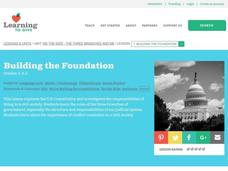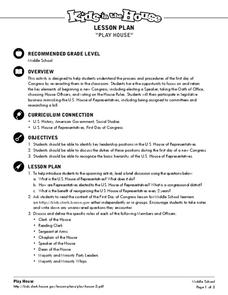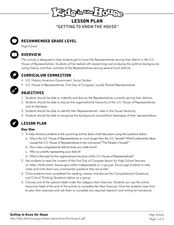Curated OER
Having the Last Word
Young scholars discuss the influence of foreign languages in their everyday speech after reading an article from The New York Times on language legislation in Brazil. Students are divided into 4 groups in order to research languages...
Curated OER
Taking From the Giving Tree
Students explore the ways in which various American cities negotiate the protection of their "green infrastructure," gaining a broader understanding of proposed and enacted legislation as it relates to preserving and planting trees in...
National Constitution Center
Separation of Powers
Learners explore how the Constitution provides for separation of power and limited government, as evidenced by the three branches of government. They participate in role-playing situations, group discussions, and complete worksheets to...
iCivics
Foreign Policy: War
What is the difference between foreign and domestic policy? What are the primary differences in what the United States hopes to accomplish through foreign aid, the military, and the creation of treaties? Your class members will examine...
Curated OER
Three Branches of Government
Fourth graders brainstorm of what they think of when they think about the word state government and list their suggestions on the board. They listen to lecture about the three branches of government understanding how each branch is...
iCivics
Separation of Powers
In a fun and informative simulation, your learners will act in groups as lead chefs, menu writers, and nutrition inspectors in deciding a new school lunch menu. They will then compare and contrast their experience to the interaction...
Delegation of the European Union to the United States
Structure of Government within the EU
The political system of the European Union is historically unique and has been constantly evolving. To better understand the structure of the EU, class members compare the EU's branches to those of the United States Federal Government.
Curated OER
Building the Foundation
Students understand the purpose of the judicial branch of government. In this judiciary lesson, students participate in exercises to understand how the court system works. Students complete activity sheets to develop understanding of...
C-SPAN
Choice Board: Expressed and Implied Powers
Article 1, Section 8 of the United States Constitution expressly lists powers given to Congress. Over the years, lawmakers have expanded the enumerated powers to include powers implied by the list. To better understand the significance...
Curated OER
Is Government Necessary?
Young scholars investigate the purpose of Congress and determine how it affects them. They explain what life would be like without government.
Curated OER
Differences and Settlement in the Legislative Budget Process
Pupils discuss the issues at hand when legislators are trying to agree on policy. In groups, they role-play different roles within a sub-committee when trying to balance the budget. They present their findings to the class and...
Curated OER
Mock Legislative Body
Students form into a mock legislative body based on their self-defined political profiles and discuss what things they would like to change in their classroom, school, and/or community. They will also propose simple laws and vote on them.
iCivics
Governing Communities
The government at the local level acts as perhaps one of the most relevant government systems to many in their communities. Learners discover how the local government shapes their lives and the similarities and differences between the...
Teaching Tolerance
Why Local Elections Matter
Uncle Sam wants everyone to vote in local elections! Geared toward middle and high school scholars, the resource explores voter turnout and the importance of local elections. Academics participate in group discussion, complete...
US House of Representatives
House History Comes Alive
How reliable is oral history? The resource uses the oral history website to help academics understand the pros and cons of using recollections to teach others. Scholars complete a worksheet, draft a letter to a representative, and...
Curated OER
Play House
Students take a closer look at representative government. For this House of Representatives lesson, students discuss their local representative in Congress and research his or her responsibilities. Students then participate in a House of...
Curated OER
Getting to Know the House
Learners take a closer look at representative government. For this House of Representatives lesson, students discuss their local representative in Congress and research his or her responsibilities. Learners respond to the provided...
Administrative Office of the US Courts
US v. Alvarez
Is it illegal to lie about military service? Discuss the ways the First Amendment affects the Stolen Valor Act with a lesson that focuses on the Supreme Court case U.S. v. Alvarez. As high schoolers learn more about the history of the...
iCivics
Voting in Congress
In a role-play activity acting as members of either the Senate or House of Representatives, class members will vote on bills to halt mail delivery on Saturdays in the United States and to raise the minimum wage. Through an included...
Curated OER
Exploring the Three Branches of Government
Pupils view a PowerPoint presentation to explore the three branches of government. Using this infromation, they identify the people, buildings and responsiblities of each branch. They complete a worksheet using the internet and take a...
Curated OER
Utah's Legislative Branch: How a Bill Becomes a Law
Seventh graders explain the steps by which a bill becomes a law. They research how a bill becomes a law within the three branches of Utah's government and synthesize their research and discussion in a classroom representation of government.
C-SPAN
How A Bill Becomes A Law
Seven steps are required for a bill to become a United States law. The Families First Coronavirus Response Act (H.R. 6201) is used as a model for the process of how a bill becomes a law. Class members work independently through a...
iCivics
The Road to Civil Rights
Here is a fantastic resource on the civil rights movement! It includes reading materials and worksheets, and particularly highlights major legislation and the role of the judicial branch in the federal government in addressing the...
Bill of Rights Institute
Celebrate Constitution Day
September 17 is a great day to focus on the US Constitution for on this day in 1787, the Constitution was signed. Through a series of activities, high schoolers get a chance to look closely at this famous document and the rights and...























